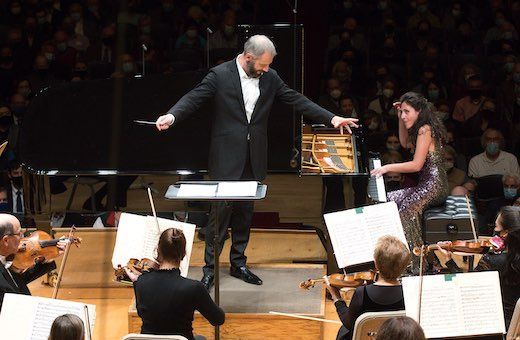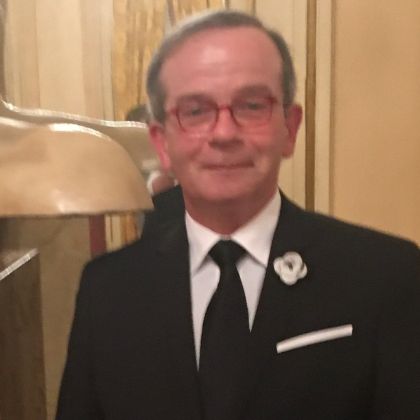As vaccines became more readily available, reconnecting with friends and family after a year or more of virtual contact became a hallmark of daily life. Two old friends came knocking this afternoon: Tchaikovsky’s First Piano Concerto and Dvořák’s Seventh Symphony. Frequent visitors in the past, they brought along two new acquaintances who will definitely be welcome visitors in the future: pianist Beatrice Rana and conductor Dima Slobodeniouk.

Hans von Bülow decided to premiere Tchaikovsky’s concerto in Boston while on tour in 1875, five years before the founding of the BSO. The public was enthusiastic; the local critics less so, a division which persists to some extent to this day. Had Rana and Slobodeniouk been the debutantes, it’s likely the critics would have been more convinced. A favorite piece for pianists to introduce themselves to new audiences, Tchaikovsky’s concerto is often reduced to an opportunistic display of one’s skills, bombarding the ears with sound and virtuosity for their own sakes. Rarely do such performances betray as deep and thoughtful an engagement with the score as Rana’s or accompaniment as hand-in- glove as that of Slobodeniouk and the BSO. A continual alternating current of inspiration passed between the two creating an ensemble performance which deserved to be preserved.
Rana is a fierce advocate for this piece, yet the forcefulness of her execution was always in service to an overarching concept of the score as a whole and didn’t preclude introspection. There was virtuosity galore, but everything she did had an expressive purpose within that concept. Her approach was both visceral and subtle and most evident when the piano played solo. Imaginative use of dynamics and rubato characterized these passages in unaccustomed ways. A prolonged standing ovation from the packed house yielded more Tchaikovsky as an encore – October (Autumn Song) from The Seasons – a cascade of Fall colors singing Summer to sleep.
The unanimity of purpose and sensitivity and attention to detail lavished on Tchaikovsky carried over to Dvořák's Seventh with Slobodeniouk inducing a dark score, shadowed by political upheaval and personal losses and preoccupations, to dance by paying particular attention to accents, rhythmic pulse and phrasing. Translucent textures and a sensitive mix of balance and blend revealed inner voices and gave equal weight to Dvořák’s density of thematic ideas. A dark, plangent sound from the lower strings created an ominous murmur throughout and to greatest effect in the Scherzo's Trio, an “et in Arcadia ego” moment tying this lighter movement with its tumult of shifting accents and furiant/waltz cross rhythms to the darkness of the other three. The marches and fanfares of the finale did not drive the usual triumphal conclusion but rather suggested resolve and determination in the face of tragedy and loss and a healing still incomplete. The muted glow of sunset rather than the affirmative flare of dawn illuminated the final pages of the score.
When a warhorse of the repertoire receives a comprehensive reappraisal such as the ones on offer this afternoon, it is a singular event. Thanks to an extraordinary ensemble effort by everyone involved, old friends arrived wearing expertly tailored new clothes inviting a closer look. As the first half of the Boston Symphony’s season draws to a close, this concert will remain not only a highlight, but hopefully a harbinger of even better things to come.


